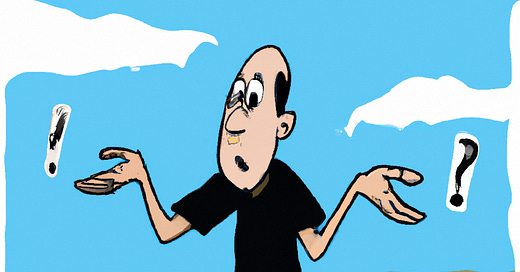Navigating Dips: To Persist or Pivot
A 5 minute guide to embracing Seth Godin's Insights for Persisting the Dip and Pivoting the Deadend
With companies mandating a return to the office, my daily commute has been reinstated, reigniting my love for the podcast world. Those precious hours spent traveling are perfect for indulging in thought-provoking conversations and inspiring stories. But as I settle into my seat on Tuesdays for a lengthy 45 minutes to an hour of auditory stimulation, and on Mondays for a snappy 25 to 30 minutes, I realize there's more to gain from these podcasts than mere entertainment. In fact, in a subsequent post, I'll share a few noteworthy recommendations. Stay tuned!
Just the other day, as I embarked on my commute, driving on autopilot, an idea expressed by a well-accomplished director in the movie industry seized my attention. The host, a figure whose accomplishments spoke volumes, uttered a single word that resonated deeply within me: "Persistence!" And while I may be paraphrasing the rest of their statement, the sentiment was clear - persistence was the key to their success. They spoke of giving their all to the field, enduring auditions and odd jobs without ever surrendering their dreams.
As the miles passed beneath my wheels, I couldn't help but reflect on their words. Does everyone persist indefinitely? Would I be willing to persist in something for the long haul? And if not, how would I know when it's time to move on? Are there discernible signals that tell me to stop, cut my losses, and chart a new course? My mind became flooded with questions, each one begging for an answer.
If you've been following this space, you know that I have a penchant for discovering patterns and drawing inspiration from them. As a leader, the concept of persistence took on new significance.
Would I be willing to persist in a pursuit for so long that it ultimately led to a dead-end? And if not, where do I draw the line?
Today, I want to share with you my thoughts on this topic and drawing inspiration from Seth Godin’s work on “The Dip” and offer a mental framework that can help you in your own decision-making.
As leaders, we are often inclined to push the gas pedal with unwavering determination, but it is equally crucial to learn how to utilize the brakes. Steering our teams in the right direction requires not only persistence but also the wisdom to recognize when it's time to change course. It is in this delicate balance that true leadership emerges.
It got me thinking so much that I had to dust off my copy of "The Dip" by Seth Godin. As I reflect on Godin's profound insights regarding dips and dead-ends, I find myself drawn to two key ideas that resonate deeply with me.
The first idea is to assess the situation and ensure that we're influencing a broader market instead of fixating on individual entities. It reminds me of times when I've passionately pursued a new idea or project, only to face setbacks and rejection. In those moments, I now realize the importance of stepping back and evaluating whether I'm directing my efforts towards a wider audience or putting all my focus on a single entity. Godin's wisdom encourages me to broaden my perspective, to see the larger landscape, and to strive to influence the market as a whole. By doing so, I increase my chances of finding success and resilience even in the face of initial obstacles.
The second idea is to build a quitting contract before embarking on the dip. This notion has truly shifted my perspective on perseverance and strategic decision-making. In the past, I've been guilty of allowing emotions to cloud my judgment when faced with challenges. But now, Godin's wisdom inspires me to take a more deliberate and thoughtful approach. By proactively
defining the conditions that would prompt me to strategically quit or redirect my efforts, I create a mental framework that keeps me grounded and rational during uncertain times. This allows me to make objective assessments based on predetermined criteria rather than being driven solely by fear or the pressure to never quit. In fact, in the product requirements document, we ask our PMs to think about and answer a couple of FAQs - "How do you know your hypothesis (about the product idea) is wrong?" or simply in an A/B experiment launch plan ask the team to define success metrics and guardrails ahead of time, so decisions can be made objectively and resist the urge to run it long enough to see positive results (in other words, a confirmation bias).
In combining these two ideas, I find a powerful approach to navigating dips in my personal and professional life. I realize that by widening my influence and seeking to impact a broader market, I can increase my opportunities for success. Simultaneously, by establishing a quitting contract in advance, I gain the ability to step back and objectively evaluate my progress. This contract acts as a guide, enabling me to make decisions based on rationality rather than getting caught up in the emotions of the moment.
As I share these thoughts with you, I invite you to reflect on your own experiences and consider how these ideas might apply to your journey. What kind of dip are you in? How can you expand your sphere of influence and strive to impact a broader group? And what parameters could you establish in your quitting contract to ensure you make informed decisions during challenging times?
Remember, true leadership requires us to introspect, to learn from others' wisdom, and to continually refine our decision-making processes. By embracing the wisdom of Seth Godin, we can approach dips with renewed clarity and purpose, navigating the fine balance between persistence and strategic quitting, and ultimately charting a course towards long-term success and fulfillment.




